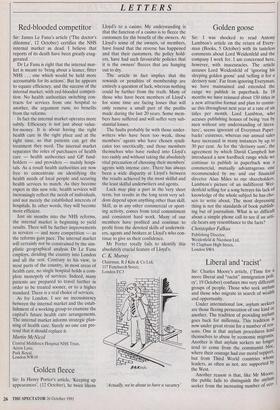LETTERS Red-blooded competitor
Sir: James Le Fanu's article (`The doctor's dilemma', 12 October) certifies the NHS internal market as dead. I believe that reports of its death have been greatly exag- gerated.
Dr Le Fanu is right that the internal mar- ket is meant to 'bring about a leaner, fitter NHS ... one which would be held more accountable for its actions'. But he appears to equate efficiency, and the success of the internal market, with red-blooded competi- tion. No health authorities switching con- tracts for services from one hospital to another, the argument runs, no benefits from the reforms.
In fact the internal market operates more subtly. Efficiency is not just about value- for-money. It is about having the right health care in the right place and at the right time, so that patients can get the treatment they need. The internal market separates the roles of purchasers of health care — health authorities and GP fund- holders — and providers — mainly hospi- tals. As a result health authorities are now free to concentrate on identifying the health needs of local people and securing health services to match. As they become expert in this new role, health services will increasingly reflect the needs of individuals, and not merely the established interests of hospitals. In other words, they will become more efficient.
Just six months into the NHS reforms, the internal market is beginning to yield results. There will be further improvements in services — and more competition — as the reforms gain pace. The internal market will certainly not be constrained by the sim- plistic geographical analysis Dr Le Fanu employs, dividing the country into London and all the rest. Contrary to his view, in most parts of the country, in most areas of health care, no single hospital holds a com- plete monopoly of services. Indeed, many patients are prepared to travel further in order to be treated sooner, or to a higher standard. There is a real choice of services.
As for London, I see no inconsistency between the internal market and the estab- lishment of a working group to examine the capital's future health care arrangements. The internal market informs strategic plan- ning of health care. Surely no one can pre- tend that it should replace it.
Martin McNicol
Central Middlesex Hospital NHS Trust, Acton Lane, Park Royal, London W/10








































 Previous page
Previous page